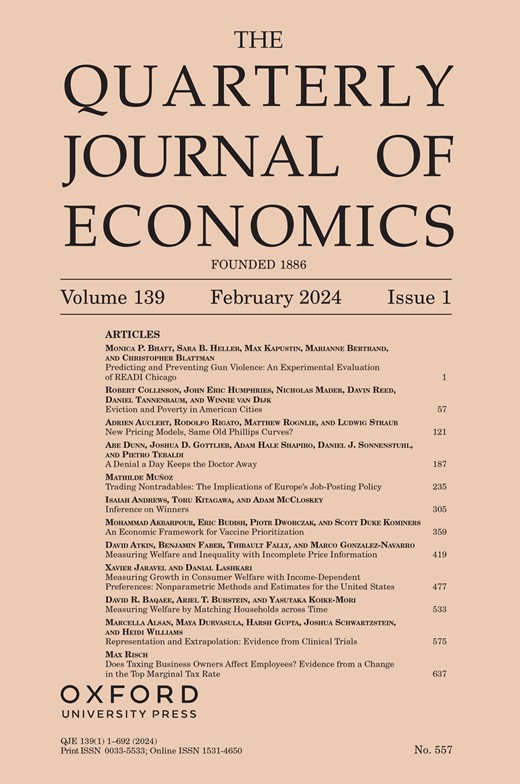A Denial a Day Keeps the Doctor Away
IF 12.7
1区 经济学
Q1 ECONOMICS
引用次数: 1
Abstract
Abstract Who bears the consequences of administrative problems in health care? We use data on repeated interactions between a large sample of U.S. physicians and many different insurers to document the complexity of health care billing, and estimate its economic costs for doctors and consequences for patients. Observing the back-and-forth sequences of claim denials and resubmissions for past visits, we can estimate physicians’ costs of haggling with insurers to collect payments. Combining these costs with the revenue never collected, we estimate that physicians lose 18% of Medicaid revenue to billing problems, compared with 4.7% for Medicare and 2.4% for commercial insurers. Identifying off of physician movers and practices that span state boundaries, we find that physicians respond to billing problems by refusing to accept Medicaid patients in states with more severe billing hurdles. These hurdles are quantitatively just as important as payment rates for explaining variation in physicians’ willingness to treat Medicaid patients. We conclude that administrative frictions have first-order costs for doctors, patients, and equality of access to health care. We quantify the potential economic gains—in terms of reduced public spending or increased access to physicians—if these frictions could be reduced and find them to be sizable.一天不承认,医生远离我
卫生保健管理问题的后果由谁来承担?我们使用大量美国医生和许多不同的保险公司之间反复互动的数据来记录医疗保健账单的复杂性,并估计医生的经济成本和患者的后果。观察过去就诊的索赔拒绝和重新提交的前后顺序,我们可以估计医生与保险公司讨价还价收取费用的成本。将这些成本与从未收取的收入结合起来,我们估计医生因账单问题损失了18%的医疗补助收入,而医疗保险和商业保险公司的这一比例分别为4.7%和2.4%。通过识别跨越州边界的医师移动和实践,我们发现,在账单障碍更严重的州,医生对账单问题的反应是拒绝接受医疗补助病人。这些障碍在数量上和支付率一样重要,可以解释医生治疗医疗补助病人意愿的差异。我们的结论是,行政摩擦对医生、患者和获得医疗保健的平等都有一级成本。我们量化了潜在的经济收益——从减少公共开支或增加就医机会的角度来看——如果这些摩擦能够减少,并且发现它们是相当可观的。
本文章由计算机程序翻译,如有差异,请以英文原文为准。
求助全文
约1分钟内获得全文
求助全文
来源期刊

Quarterly Journal of Economics
ECONOMICS-
CiteScore
24.20
自引率
2.20%
发文量
42
期刊介绍:
The Quarterly Journal of Economics stands as the oldest professional journal of economics in the English language. Published under the editorial guidance of Harvard University's Department of Economics, it comprehensively covers all aspects of the field. Esteemed by professional and academic economists as well as students worldwide, QJE holds unparalleled value in the economic discourse.
 求助内容:
求助内容: 应助结果提醒方式:
应助结果提醒方式:


